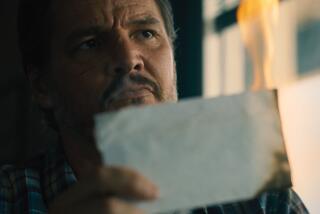Sound in the Theater Raises Fury in the Audience : Movies Are Turning Into Loud Theme Rides as Plots Get Flimsier
- Share via
“Loud . . . loud . . . LOUD.” This really should have been the title for Robert Welkos’ article on movie theater sound systems (“Creating the Roar for the Crowd,” Calendar, June 1). In sum, he seemed to be saying that--from the audience’s point of view--there really isn’t any difference from one to the other.
Perhaps not. But something else is happening here.
Films seem to be evolving into theme park rides. Effects replace plot. Noise takes over for logic.
Was there any story to “Twister”? Was a head-splitting music score the only way to build tension in “The Rock”? Or was it there just to blast away any critical thoughts the audience might have had about a highly contrived plot? Current films seem to have removed plot and character and substituted speed, spectacle and excessive decibels.
Each time a film begins with that pretentious “THX Sound System” logo, my wife (probably the only intelligent one in the building) quickly covers her ears to avoid that eardrum-piercing attempt to make us aware of the assaults lying in store for us.
Is there some basic reason why the sound keeps getting louder and louder and the plots get thinner and thinner?
I think there may be several reasons.
Much of the current film audience grew up in the television era--and apparently so did many of the filmmakers. From “The Brady Bunch” to “The Fugitive,” from “The Addams Family” to “Mission: Impossible,” it seems that these old TV shows are what those writers and directors remember. And there seems to be a built-in audience for them. So what we get is old TV recycled to the big screen.
Now, however, we have the special effects and sound control to far outdo what these shows on the tiny screen once gave us. So pump up the volume and try to make a cinematic silk purse out of that old TV sow’s ear.
But this television-nurtured audience acquired another habit. While the shows flickered across the little screen, the home audience was free to criticize the commercials and loudly voice approval or disapproval. It didn’t matter in the privacy of one’s own room.
But now in the theater many continue to voice their reactions as if they were at home. The talkers have begun to proliferate.
Could it be that movie soundtracks have gotten louder--not just to show off that sophisticated audio technology--but to drown out the audience? Even the characters in “Twister” seemed to be screaming at each other through much of the film!
Maybe this behavior has moved to other areas as well. Ask a few teachers you know how difficult a time they are having quieting down a class of pre-teenagers. Are they being disrespectful or are they just continuing behavior they grew up exhibiting in front of the TV screen?
Excessively noisy film soundtracks, however, may be responsible for keeping the older audiences from the movie houses. In their booming appeal to the boomers it seems that many filmmakers are deliberately trying to keep audiences away. Are they so wedded to the 16- to 25-year-old audience that they don’t care about the rest of us who actually go to the movies for silly little things like intelligent plots and subtlety of character? And do they realize that continuing to divide audiences takes us one more step in the direction of dividing young and old at the very time when communication between generations seems to be most critical?
If movies merely continue to get louder, I fear that too many of the older generation will be content to wait for the video. At least then we will have control over the volume.
More to Read
Only good movies
Get the Indie Focus newsletter, Mark Olsen's weekly guide to the world of cinema.
You may occasionally receive promotional content from the Los Angeles Times.









